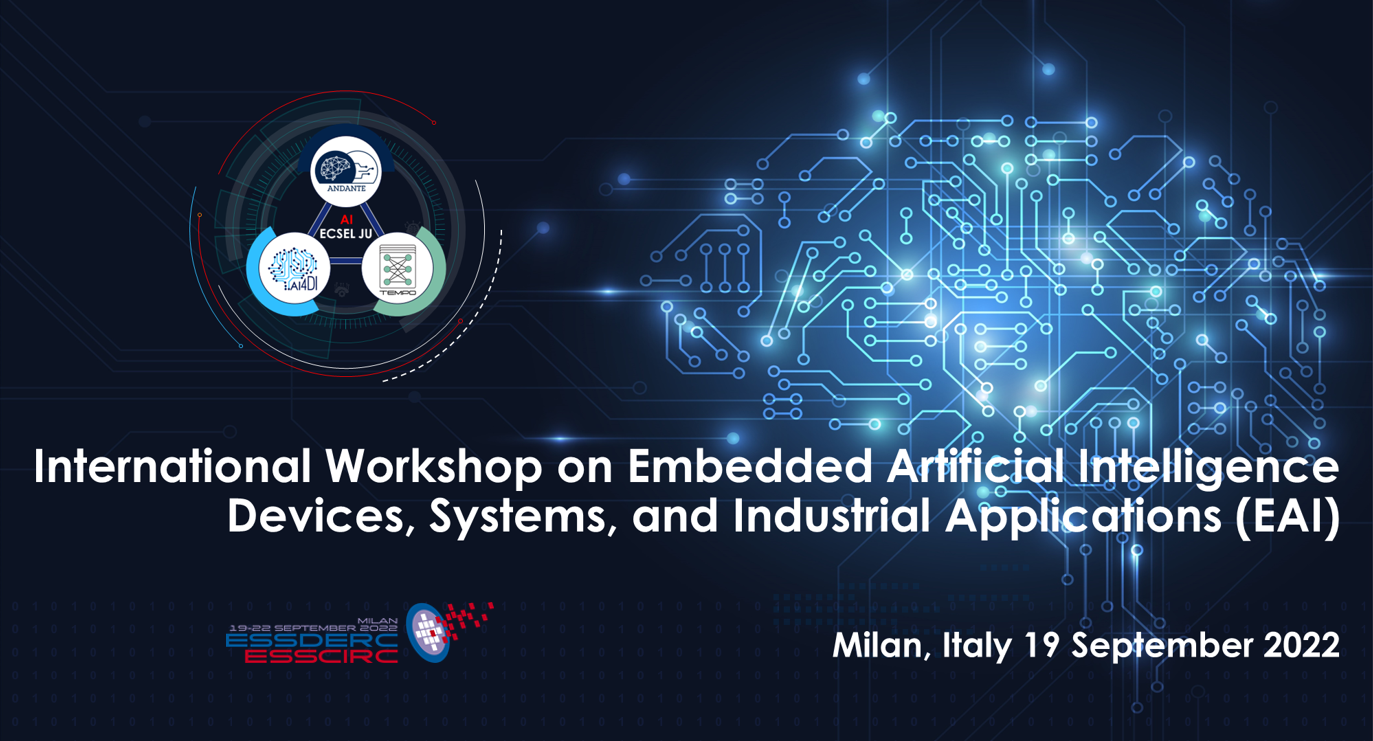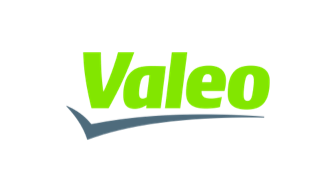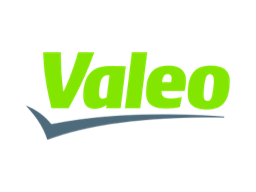International Workshop on Embedded Artificial Intelligence (EAI) - Devices, Systems, and Industrial Applications
The International Workshop on Embedded Artificial Intelligence (EAI) – Devices, Systems, and Industrial Applications is part of the ESSCIRC ESSDERC 2022 European Solid-state Circuits and Devices Conference held in Milan, Italy, on 19 September 2022. This workshop combines academics, researchers, and industry practitioners from various fields, including AI, cyber-physical, and embedded systems, microelectronics circuits and devices, edge computing, and autonomous integrated systems. Different views on current and future embedded AI are discussed, and the latest developments in devices, techniques, and industrial-edge applications are presented. The workshop also includes invited keynote talks and presentations with audience opportunities to interact with the speakers, discuss novel and exciting research, and establish new and fruitful collaborations in the embedded AI field. The EAI workshop is co-organised by three large-scale ECSEL JU projects: AI4DI, ANDANTE, and TEMPO, to provide a platform to exchange knowledge and ideas among experts and professionals interested in advances in AI circuits and device design, AI hardware architectures, industrial edge AI technologies, toolchains, and applications.
-
EAI workshop agenda
-
European Embedded AI Ecosystem
Frank Badstübner (Infineon Technologies AG, DE)
Björn Debaillie (imec, BE)
Mario Diaz Nava (STMicroelectronics, FR)
Ovidiu Vermesan (SINTEF, NO)
Large-scale projects overview: ECSEL JU AI4DI, TEMPO, ANDANTE -
Giacomo Indiveri (University of Zurich, CH)
Bio-inspired On-line Learning Circuits for Low-power Extreme-edge Spiking Neural Network Processing Systems -
Session: Embedded AI devices and systems (Moderator: Björn Debaillie, imec, BE)
Frédéric Pétrot (University Grenoble Alpes, FR)
Power Optimised Wafermap Classification for Semiconductor Process Monitoring -
Roland Müller (Fraunhofer IIS, DE)
Low-Power Analog In-memory Computing Neuromorphic Circuits -
Loreto Mateu (Fraunhofer IIS, DE)
Tools and Methodologies for Edge-AI Inference Accelerators -
Sourav De (Fraunhofer IPMS, DE)
Low-Power Vertically Stacked One Time Programmable Multi-bit IGZO-Based BEOL Compatible Ferroelectric TFT Memory Devices with Lifelong Retention for Monolithic 3D-Inference Engine Applications -
Session: Embedded AI solutions (Moderator: Frank Badstübner Infineon Technologies, DE)
Bernhard Lippmann (Infineon Technologies, DE)
Addressing Physical and Functional Reverse Engineering Challenges for Advanced IoT Solutions with AI -
Ivan Miro-Panades (CEA-List, FR)
Meeting the Latency and Energy Constraints on Timing-critical Edge-AI Systems -
Dylan Muir (SynSense, CH)
Low-power Neuromorphic Auditory Processing - Silicon to Applications -
Sara Loi (STMicroelectronics, IT)
Artificial Intelligence: The Impact in the Semiconductor World -
Jianyu Zhao (Infineon Technologies AG, DE)
An Embedding Workflow for Tiny Neural Networks on ARM Cortex-M0(+) Cores -
Ovidiu Vermesan (SINTEF, NO)
Architecting Edge AI Workflows for Predictive Maintenance in Industrial Applications -
Ismail Rameez (Philips Research, NL)
Food Ingredients Recognition Through Multi-Label Learning
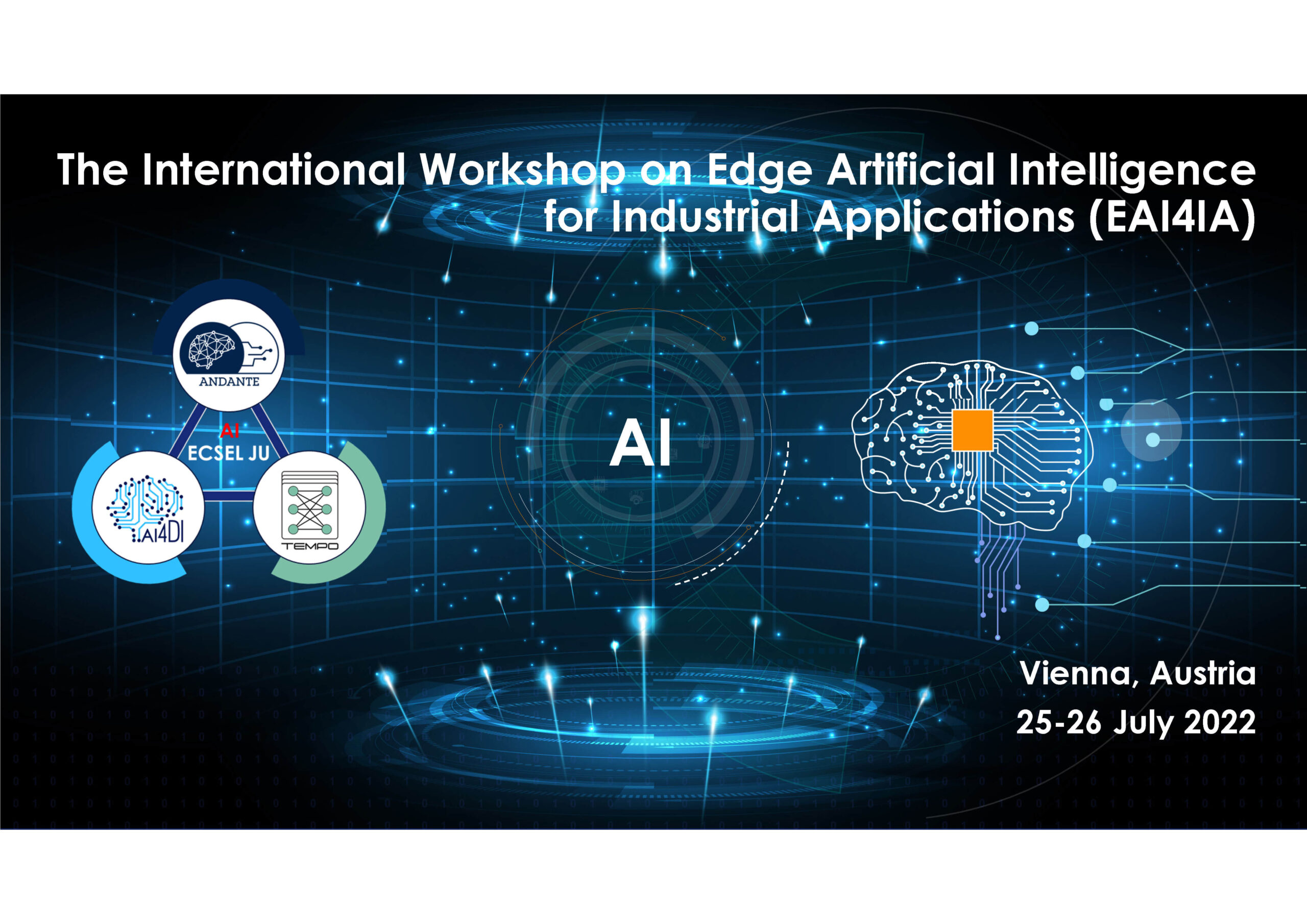
International Workshop on Edge Artificial Intelligence for Industrial Applications (EAI4IA)
EAI4IA is a multidisciplinary workshop addressing AI technologies at the edge, giving an overview of silicon-born AI components to advance Moore’s law and accelerate the adoption of AI-based edge processing in different industries. Technological advances regarding edge AI embedded in electronic components and systems are presented, and the challenges of introducing embedded AI technologies for digitising industrial sectors are discussed. It is co-organised by three large-scale ECSEL JU projects: AI4DI, ANDANTE and TEMPO. EAI4IA comprises technical presentations, keynotes and panel discussions focusing on industrial-edge AI hardware, software and AI.
Four papers from TEMPO are accepted for presentation at the workshop. All presentations are listed below. The workshop publications are bundled in an open-access book: Industrial Artificial Intelligence Technologies and Applications (riverpublishers.com).
-
EAI4IA workshop agenda
-
Session: Trustworthy, Dependable AI for Digitising Industry
Frank Badstübner (Infineon Technologies AG, DE)
Artificial Intelligence for Digitizing Industry (AI4DI) -
Björn Debaillie (imec, BE)
Technologies and hardware for neuromorphic computing (TEMPO) -
Mario Diaz Nava (ST Microelectronics, FR)
AI for New Devices and Technologies at the Edge (ANDANTE) -
Session: Trustworthy, Dependable AI for Digitising Industry
David Kaufmann (AVL LIST, AT)
A framework for integrating automated diagnosis into simulation -
Lucas Mohimont (Université de Reims Champagne Ardenne, FR)
AI-Driven Strategies to Implement a Grapevine Downy Mildew Warning System -
Dinu Purice (Cognition Factory GmbH, DE)
An End-to-End AI-based Automated Process for Semiconductor Device Parameter Extraction -
Session: Embedded AI for semiconductor manufacturing
Annika Wandesleben (Fraunhofer IMPS, DE)
Feasibility of wafer exchange for European Edge AI pilot lines -
Saad Al-Baddai (Infineon Technologies AG, DE)
Failure detection in semiconductor package -
Lan Liu (Know-Center GmbH, AT)
S2ORC-SemiCause: Annotating and Analysing Causality in the Semiconductor Domain -
Dmitry Morits (VTT, FI)
AI machine vision system for wafer defect detection -
Session: AI model development workflow and HW target platforms deployment
Ovidiu Vermesan (SINTEF, NO)
Embedded Edge Intelligent Processing for End-To-End Predictive Maintenance in Industrial Applications -
Simon Narduzzi (CSEM, CH)
Deploying a Convolutional Neural Network on Edge MCU and Neuromorphic Hardware Platforms -
Ruben Prokscha (OTH Amberg-Weiden, DE)
Efficient Edge Deployment Demonstrated on YOLOv5 and Coral Edge TPU -
Preetha Vijayan (imec & TU Delft, NL)
Temporal Delta Layer: Exploiting Temporal Sparsity in Deep Neural Networks for Time-Series Data -
Session: Strategic Vision and Road mapping
Yves Gigase (KDT, BE)
The KDT Joint Undertaking. A tutorial for the next generation of policy-makers and decision-takers -
Dylan Muir (SynSense, CH)
Disruptive technology development through SMEs. A view from Neuromorphic edge AI -
Gerhard Friedrich (Universität Klagenfurt, AT)
Strategic vision and road mapping: Industrial success stories of answer set / constraint programming. What’s still open? -
Session: Explainable AI in the Embedded Electronics Industry Environment
Georgi Kuzmanov (KDT, BE)
Key Digital Technologies JU. ECSEL and KDT Industrial AI Area -
Session: Verification, Validation and Benchmarking of AI Systems and Technologies
Loreto Mateu (Fraunhofer IIS, DE)
Benchmarking Neuromorphic Computing for Inference -
Amirreza Yousefzadeh (imec, NL)
Benchmarking the Epiphany processor as a reference neuromorphic architecture -
Franz Wotawa (Graz University of Technology, AT)
On the Verification of Diagnosis Models -
Session: Emerging AI Technologies in Industrial Applications
Reiner John (AVL, AU)
The Future of Decision Making in SAR Quantum technology & distributed intelligence
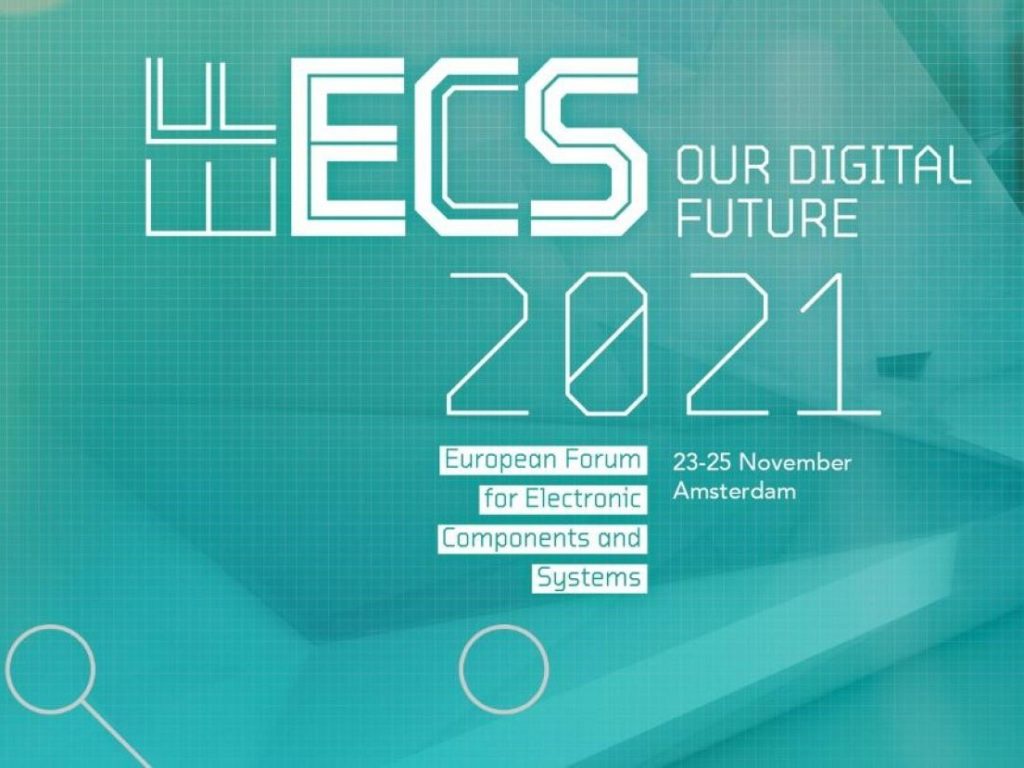
European Forum for Electronic Components and Systems (EFECS)
EFECS is the international forum with a focus on ‘Our Digital Future’ for a green and competitive Europe along the Electronic Components and Systems value chain in Europe.
TEMPO had a successful (online) booth at EFECS 2021 exhibition, where we presented many posters on the project and its key demonstrator.
-
Project overview: Technology and hardware for neuromorphic computing
Enabling efficient yet powerful edge AI devices.
-
Project domains: Technology and hardware for neuromorphic computing
Benchmark & demonstrate across multiple application domains.
-
Project value chain: Technology and hardware for neuromorphic computing
Strengthen the European’s value chain and ecosystem.
-
Improved localization with radar through neuromorphic computing
Obtain enhanced angular positioning without increasing the # antennas.
-
Gesture recognition at the edge through neuromorphic computing
Enabling intuitive & natural human-machine interaction.
-
Medical x-ray image denoising through neuromorphic computing
Increasing OR efficiency with improved imaging.
-
Spotting keywords in speech through neuromorphic computing
Enabling next-gen voice-controlled virtual assistance.
-
Surround sensing for automotive through neuromorphic computing
With enhanced energy efficiency, computing speed and smaller footprint.
-
Real-time nutrition assessment through neuromorphic computing
Obtain the caloric contents and nutritional values from food plate images.
-
Object detection & sound localization through neuromorphic computing
Maximizing versatile and flexible in-memory processing.
-
Scalable energy efficient neuromorphic computing architecture
Enabling platform for a diversity of SNN applications.
Workshops on reference TEF for AI in the Digital Europe Programme
The European Commission organized a number of workshops on reference testing and experimentation facilities (TEF) for Artificial Intelligence in the Digital Europe Programme.
One of those workshops was specifically aimed at edge AI. Edge AI TEFs were recognized by the participants as an opportunity in the area of neuromorphic chips, embedded AI, tiny machine learning, low-power hardware components as well as for EU designed and built chips for data processing at local level.
Two of the presenters (being also TEMPO consortium partners) made a reference to the TEMPO project in their presentations. These presentations can be found here below.
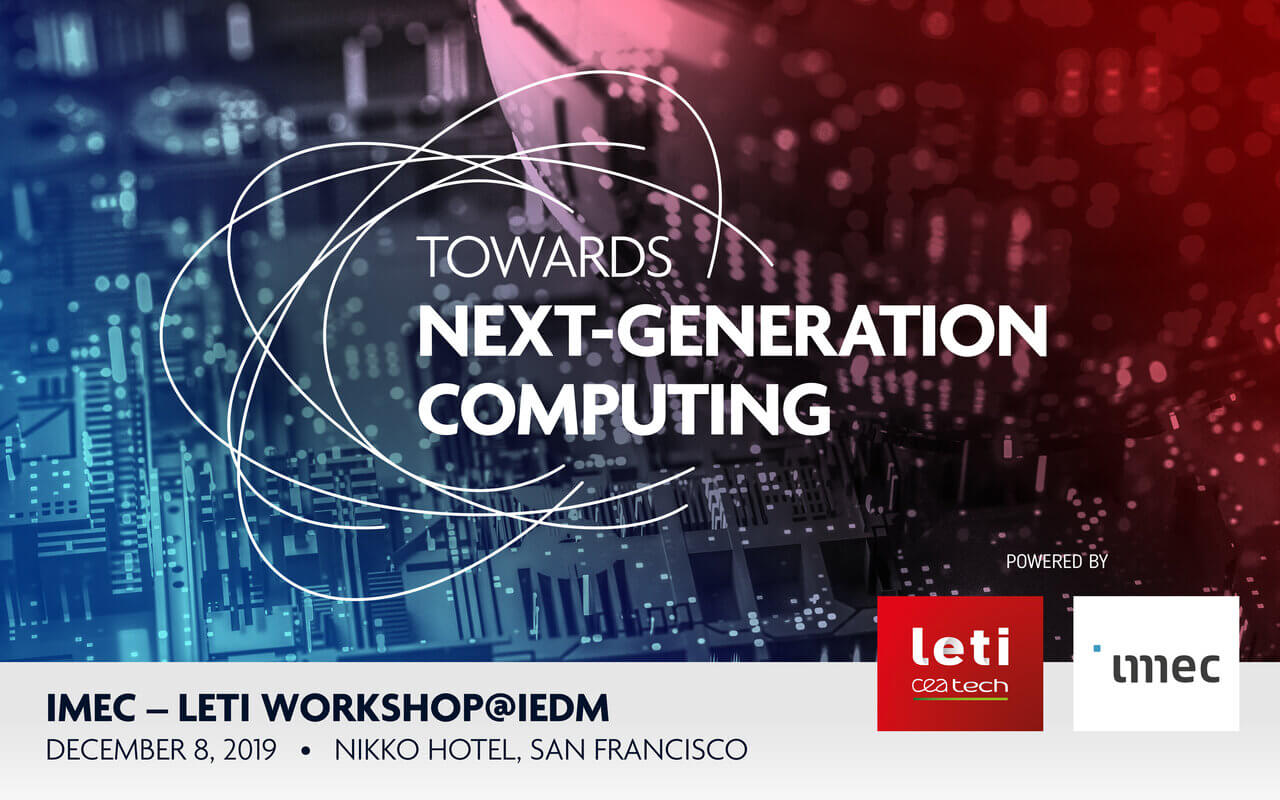
Towards next-generation computing, workshop at IEDM
The “Towards next-generation computing” workshop, organized on the eve of the 2019 IEEE International Electron Devices Meeting (IEDM), focussed on the groundbreaking results in nanoelectronics, micro and digital technology.
This pre-IEDM 2019 workshop offered strategic networking opportunities and a head-start towards next-generation computing.
Both imec and CEA presented their views connected to TEMPO.
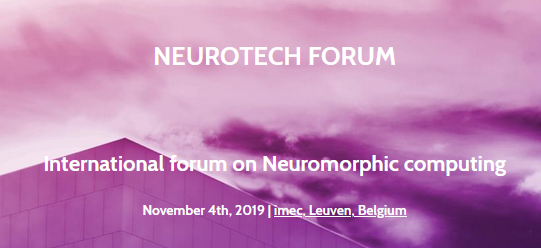
International Forum on Neuromorphic Computing
The Neurotech forum is an initiative of the Neurotech project, a Coordination and Support Action (CSA) funded by the European Commission. This CSA aims to be the connecting element to consolidate and disseminate the state of the art of neuromorphic technology and to create a transforming roadmap for future progress, unleashing the power of NCT in smart technologies of the future.
At the International Forum on Neuromorphic Computing, TEMPO gave a presentation on the fundamental project goal being to develop technology platforms for emerging semiconductor devices and demonstrate them for energy efficient hardware implementation of neuromorphic workloads. In addition to this presentation, speeches were given by other members of the TEMPO consortium on their view and accomplishments in neuromorphic computing.
European Extreme Data & Computing Initiative (EXDCI-2) workshop
EXDCI-2 organized a workshop on “New technological paths for high performance chips targeting HPC and edge”. The objective of this workshop was to address the challenges of increasing demand for performance in regards to chips and HPC systems, as well as the technological approaches that would need to be developed to tackle these issues.
Ultimately, the outcomes of the workshop are expected to serve as arguments to get more adequate research calls in Horizon Europe and in EuroHPC JU programs
TEMPO gave a speech on neuromorphic research performed in the project.

